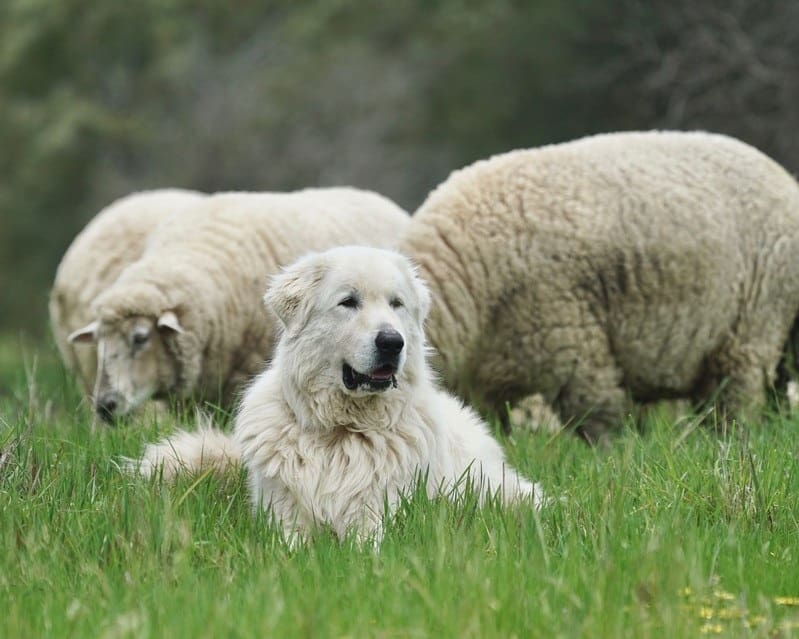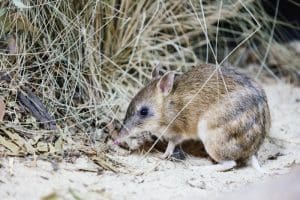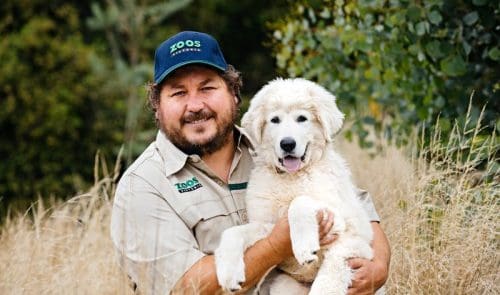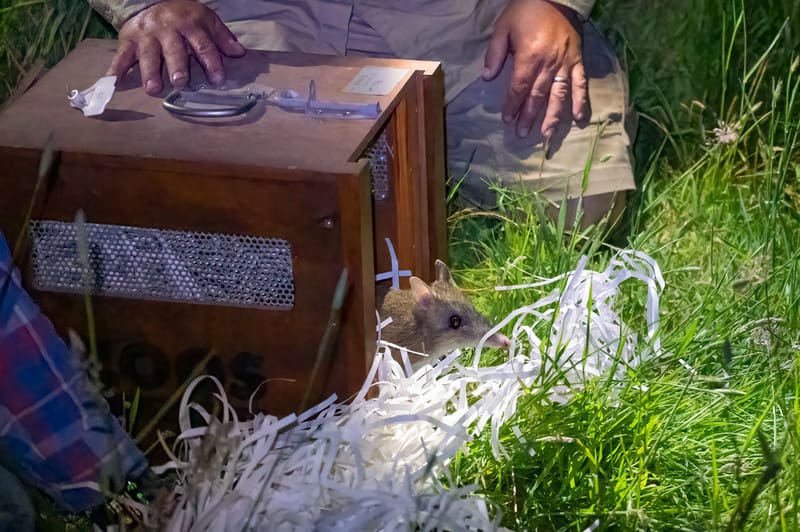
A Maremma guardian dog with sheep. Image – Zoos Victoria.

A female Eastern Barred Bandicoot in Bandicoot. Image – Zoos Victoria.
LIVESTOCK guardian dogs traditionally used to protect sheep and goats are the latest weapon in a unique project to protect endangered Eastern Barred Bandicoots on a western Victoria farm.
The dogs have been used historically to guard sheep and goats around the world, and in Australia they have also been used to protect chickens for free range egg production and to save penguins endangered by fox predation.
Now in a collaborative research trial by Zoos Victoria and the University of Tasmania, 20 bandicoots have been released into the Mooramong National Trust of Australia (Victoria) conservation reserve at Skipton with 145 crossbred sheep, under the protection of two specially-trained Maremma dogs.
The Zoos Victoria Guardian Dog Project aims to reintroduce populations of the notoriously gentle and shy native marsupials back into the wild on mainland Victoria.
Dogs are trained to focus on sheep not bandicoots

Zoos Victoria guardian dog project co-ordinator David Williams with Maremma pup Albus. Image – Zoos Victoria.
Zoos Victoria guardian dog co-ordinator David Williams said the research trial was the culmination of four years of training Maremma dogs – a large, territorial breed – to ignore the Eastern Barred Bandicoots at Werribee Open Range Zoo.
“We’ve trained the dogs to leave the bandicoots alone, and instead bonded the dogs to protect a flock of sheep,” Mr Williams said.
“The dogs are not bonded directly to the bandicoots as they are solitary and nocturnal – so they do not flock.
“However, sheep do flock, and in the Skipton reserve the sheep can eat grass, bandicoots can live in the grassland, and all three species can share the same habitat,” he said.
The Maremmas were raised as puppies alongside Eastern Barred Bandicoots so they became familiar with bandicoots from a young age.
“Over a four-year period at the Zoo, the Maremmas were trained with positive reinforcement to recognize and ignore Eastern Barred Bandicoots when they saw them.
“The Maremmas were rewarded for not approaching and moving away from Bandicoots in enclosed and free range situations during daylight hours and at night time,” Mr Williams said.
“The Maremmas were also bonded with a flock of sheep at the zoo, and trained to protect the sheep and the field they inhabit from predators.
“The purpose of bonding the Maremmas to the sheep was so that they could protect the areas where Zoos Victoria would eventually release bandicoots back into the wild at Skipton,” he said.
The last dog graduated from the training program in July this year (2020).
A self-sustaining bandicoot population is the goal

An Eastern Barred Bandicoot is released. Image – Zoos Victoria.
A team of scientists and conservationists are tracking and monitoring the movements of the bandicoots and the dogs as the canines actively seek to deter predatory foxes away from the site.
Eastern Barred Bandicoots were once widespread across the grassy woodlands of south-west Victoria; however, extensive habitat degradation and the spread of introduced predators following European settlement led to the populations plummeting. Today, Eastern Barred Bandicoots are extinct in the wild on mainland Australia.
The Eastern Barred Bandicoot Recovery Team was formed in the late 1980s. A captive breeding and insurance program managed by Zoos Victoria, combined with releases into fenced and island safe havens, has prevented the extinction of the Eastern Barred Bandicoot. However, further efforts are required to support the species’ long-term future.
Mr Williams said the research trial’s key measure of success will be the establishment of self-sustaining populations of bandicoots, first at Skipton and then at several other sites in western Victoria – including Dunkeld in 2021.
“As the bandicoots are going back into natural habitat on the mainland, some may not make it through the journey.
“However, the aim is that the presence of the dogs will alter the behaviour of the foxes, which will allow the Eastern Barred Bandicoots to thrive in that environment once again,” he said.
National Trust of Australia (Victoria) chief executive officer Simon Ambrose said The National Trust welcomed the endangered Eastern Barred Bandicoot back home to the western districts of Victoria.
The conservation reserve at Skipton is equipped with 35 remote wildlife cameras and the guardian dogs are fitted with GPS trackers. Additionally, all bandicoots are fitted with radio transmitters, weighing 1.32 grams that allow researchers to closely track their activity throughout the 50-hectare space.
The Zoos Victoria Guardian Dog Project is modelled on the successful Middle Island Maremma Project, where Maremma dogs are trained to protect penguins from foxes during breeding season. This is the first time that the method is being applied to an endangered marsupial and in an open landscape.
The Eastern Barred Bandicoot Recovery Team has members from Conservation Volunteers Australia, Department of Environment, Land, Water and Planning (DELWP), Mt Rothwell Biodiversity Interpretation Centre, National Trust of Australia (Victoria), Parks Victoria, Phillip Island Nature Parks, the University of Melbourne, Tiverton Property Partnering and Zoos Victoria.
The Zoos Victoria Guardian Dog Project has members from Dunkeld Pastoral Company, National Trust of Australia (Victoria), Tiverton Property Partnering, the University of Melbourne, the University of Tasmania and Zoos Victoria.



HAVE YOUR SAY